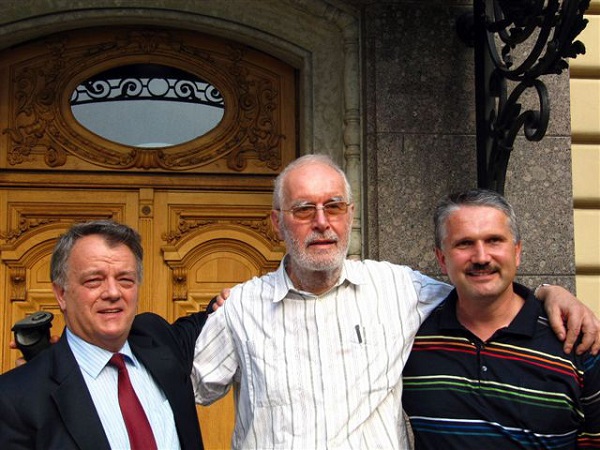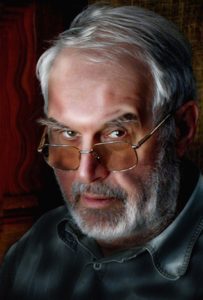Theodora Pavlovitch,
Professor of Choral Conducting at the National Academy of Music Sofia, Bulgaria
Theodora Pavlovitch (TP): How would you describe your compositional style?
Rajko Maksimović (RM): Over the course of my life my style has greatly changed. When I graduated, in 1961, I was curious to know what was going on in the world, and during the 1960s I belonged to the so-called avant-garde in Serbia. We used clusters, wrote aleatoric music, explored atonality and so on. These aspects mostly apply to my chamber and orchestral music, but also to Three Haiku, for female choir and ensemble, which was commissioned by and premiered at the Zagreb Biennale, in 1967. In 1963 I wrote a six-movement epic partita When the Living Envied the Dead, for choir and small orchestra, a work that displays the above characteristics, but also – because it uses medieval Serbian texts – reveals just how I was attempting to recreate the atmosphere prevalent at the time. On many occasions the ancient text itself generated appropriate melodic lines. As for the entire fourth movement, ‘Prince Lazar’s Plea/Holy Communion’, it is entirely a cappella, and produced back then quite an astonishing sound, because it sounded like a choir in the Orthodox Church: diatonic, sweet, and harmonically correct.
Later on, when my music started to be performed more often, and particularly after I had got in touch with the amateur choir Krsmanović, I realized that the most important goal for me is not what critics say in their newspaper reviews, but communication with singers and players who otherwise are singing and playing Mozart, Bach, Verdi, Orff…and who surely know what music really is. I started to adjust my musical ideas in order not only to be sung easily, but also to make it pleasurable for performers. And that happened more and more…Testament and Passion are the best examples of this.
Two years ago I was in Washington with a new friend of mine and during a conversation, all of a sudden, to illustrate something, he precisely sang two bars from my madrigal Then there Was Famine! Just where the basses have the words ‘I ješte že’ [‘And still another’, Ed.]He remembered it from the 1970s, when he was a member of the chorus in the town of Subotica and had sung that madrigal.
I would say that my best, largest and most significant work – The Saint Prince Lazarus Passion – is in a ‘neo-Byzantine’ style. It has diatonic, actuallymodalmelodies, occasionally uses ‘Isson’ [the low bourdon or ‘note tenue’ in Byzantine chant, Ed.], and excludes clarinets and trombones, since these instruments were not in use in mediaeval times.
TP: Which composers do you find most important for contemporary music in Serbia and how do you see its future?
RM:We have many composers who produce excellent music and are, I think, even better than the previous generation. In my opinion, the bestare Zoran Erić and Milan Mihajlović. But theyonly write instrumental music, I am sorry to say. Each has written only one choral piece to date, as far as I know. With regard to choral composers, I feel the best are Kosta Babić, who died recently, Aleksandar Vujić and Dimitrije Golemović.
I cannot forecast the future, but at the present I am witnessing an excellent type of cooperation between composers and individual players and ensembles. They play our music really enthusiastically. But our State institutions do not recognize the high quality of our players, and conductors and composers, and do not support them adequately. The leader in that sense is the Belgrade Philharmonic. In one season they give 30-40 concerts, but only one or two Serbian conductors or players appear, and these are from abroad, i.e. do not live in Serbia. Also, only three or four Serbian compositions are programmed. That is the reason why we have many excellent players, conductors and composers who no longer actually live in the country.
TP: Would you tell us more about your connection with Witold Lutosławski, the great Polish master?
RM: I first met him at the Zagreb Biennale in 1963 when his Trois Poemes Henry Michaut was premiered. I loved that music and I found it highly influential at the time. The same year I went to Warsaw for almost a month. And I attended the festival Warsaw Autumn, where Trois Poemes were performed for the second time. Among other works, Penderecki’s Polimorphia was premiered. But before the festival started, I became friends with some Polish people I had met and – believe it or not – little by little, I started to speak Polish! Certainly, during the 1960s and 1970s I was considered a follower of the Polish School. Considering the avant-garde at that time, I disliked Cage, Kagel, Boulez (as a composer, but I highly respect him as conductor), Stockhausen, Xenakis and others, considering that they only broke down and finally destroyed ‘traditional’ musical language but did not create any real new music. Contrary to that, I stated that “Polish composers have made real new music.” In 1975 Belgrade Television decided to record an interview with Lutosławski and some other Polish composers. I was appointed as the interviewer.
I recorded several interviews in Polish – with Henryk Górecki, Tadeush Baird, Zygmund Krauze, and some others. (Penderecki was in Krakow.) Finally, we met Lutosławski, convening with him over a course of two days – first in the Union of Composers, and later at his private home. We chatted in Polish but did the interview in English, since we were dealing with the most serious of subjects and I did not want to take any risks.
TP: Which other composers have influenced you over the years?
RM: During my studies, my idols were Stravinsky, Prokofiev and Bartok. Later on, Lutosławski and Ligeti. But during the 1980s and later on too, I thought I was trying to find my own style, based on mediaeval Serbo-Slavonic language and Byzantine tradition, as well on the masterworks of Bach (my first love), Mozart and Debussy. Besides that, in the late 1970s and subsequently I was engaged in studying the existent modes and was trying to expand existing theories as well as developing my own modes. Lutosławski said that tonality was worn out and I agreed with that. But I stated that it should be replaced with something else, some kind of order and not chaos! More and more I found myself using modes – sometimes medieval ones such as Dorian and Phrygian, but also my own ones (see my website www.rajko-maksimovic.net /Books/ More On Modes, in English).
TP: What moments of your artistic life do you consider the most valuable?
RM: There are several: the performance of Saint Prince Lazarus Passion in Tours, France, 1989, with Serbian soloists, Krsmanović choir, Armenian Orchestra and Darinka Matić-Marović conducting; three portrait concerts (1987, 1996, 2006) in the prestigious Kolaratz Hall (almost a full house for each concert); the performance of Testament in St. Petersburg with Choir & Orchestra of Cappella Glinka, Vladislav Chernushenko conducting; the performance of Testament in Burgas (Bulgaria), with a local choir and orchestra under Yordan Dafov; and the performance of the Saint Prince Lazarus Passion in Belgrade, December 2010 (after a gap of 21 years). The latter event was a tremendous success – in spite of challenging circumstances – and the choristers of both choirs were delighted, as too were the soloists, members of the orchestra, and the audience. I am deeply thankful to conductor Boyan Sudjić for what I called the ‘event of my life’.
TP: You wrote and published several books: the autobiographical memoir trilogy ‘That’s the Way It Was’ (1998, 2001, 2002) and ‘Speech of Music’ in 2008. How did you find inspiration to write them?
RM: I would say it happened by accident. When my older brother died in 1995, I realized that I had become the oldest member of our large (Maksimović) family. Then I decided to write some 10-20 pages about my parents, grandfather, and uncles – things that I could remember – for our descendants. When I finished, I gave some copies to a couple of friends who knew my family. They suggested independently that I continue to write not only about the dead but also about the living. I agreed, and having no other obligations, I found it easy to write the first book (covering the period up to 1965) and printed it privately (1998). All who had read it were delighted and all 500 copies were sold very soon.
That reaction encouraged me to continue. I started with my trip to America (Fulbright scholarship, 1965/66) and finished with Saint Prince Lazarus Passion (1989). The promotion of the second book happened to coincide with the exact moment when, live on television, the twin towers of the WTC were demolished on 11th September 2001. Nevertheless, the hall was full, with about 150 people. This was when the text for the third book was more or less finished. I announced the fact and at the same time promised not to write any more books in the future. The third tome was soon available. It is about our struggle against Milošević, and deals with demonstrations, protest walks, my newspaper articles, and many other things. The fourth book you mentioned is actually a kind of interview. In 1991 Miloš Jevtić, a journalist at Radio Belgrade, asked me onto his live radio show. He intended to publish the book, but the general situation in the 1990s prevented him. We met in 2005 or 2006 and we agreed to come up with new questions and answers, and to publish both the previous version and the new one together.
TP: What are your latest pieces?
RM: I have just finished a choral work this year, LAMA, setting lyrics by Ogden Nash in a brilliant translation by Dragoslav Andrić. But normally I do not write anything new. I try to find possibilities of performance for earlier works that were proven to be good. Or I make adaptations. I arranged a Suite for Orchestra out of four movements from Passion. Also from the Passion, I completed Suite for Violin & Strings, which had already been performed. I have adapted too Testament, as well as Passion, and they can now be sung in English! I hope thismay help in the future.
TP: What would be your final message to readers of the International Choral Bulletin?
RM: I suppose I can draw on quite vast experience, and would say that the meaning and sense of composition itself lies in the performance. If there is no performance, it makes no sense. The score on paper is not yet the music. It is just a hypothetical project. When the performance happens, then it becomes music. As if to prove a point, I do not sell my music. I simply give it away. Today, with the advent of the e-mail, it is very easy indeed: rajkomaksimovic88@gmail.com
Revised by Cara Tasher
Edited by Graham Lack


